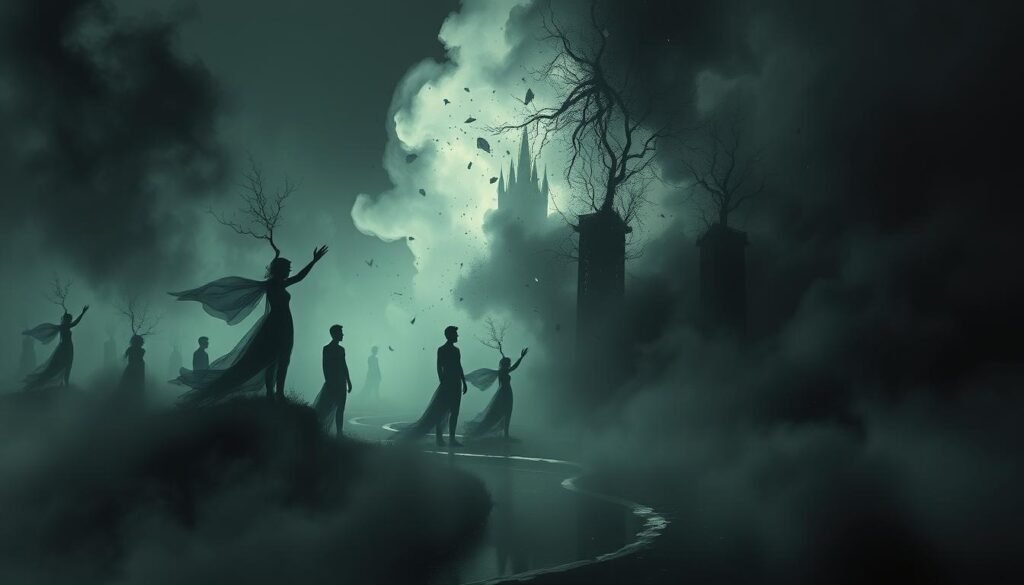Did you know one in four people treated for depression also see things that aren’t there or believe things that aren’t true? This mix of severe depression and false beliefs or sights is called psychotic depression. Recognizing the signs early is key to getting the right help quickly.
This condition does more than just affect your mood. It greatly increases the chance of suicide over depression alone. Knowing the symptoms, what causes it, and how to treat it is critical. Treatment often involves medicine, therapy, and support from friends and family.
Key Takeaways
- Psychotic depression affects approximately 25% of those hospitalized for depression.
- It combines symptoms of major depression with psychotic experiences.
- The risk of suicide is higher in individuals with psychotic symptoms.
- Effective treatment often includes a combination of medication and therapy.
- Early diagnosis can lead to better recovery outcomes.
- Long-term medication use may be necessary to prevent recurrences.
What is Psychotic Depression?
Psychotic depression is a severe mental health disorder. It mixes intense depression symptoms with losing touch with reality. People with it feel very sad, tired, sleep poorly, see things that aren’t there, and believe things that aren’t true, matching their deep sadness.
This type of depression is not just about being exhausted emotionally and physically. It also includes psychosis, risking suicidal thoughts and actions. Common signs are not wanting to eat, feeling worthless or guilty, and thinking a lot about harming oneself.
Doctors put depression into different levels of severity, from light to very serious. What treatment a person needs depends on how severe their depression is. It requires close watch and a plan that is just right for them. We don’t fully understand why people get this disorder, but it might be due to genes, body issues, or mental reasons.
To treat psychotic depression, doctors use a mix of meds like antipsychotics and antidepressants. Talking therapy and strong support from friends and family help too. In tough cases, Electroconvulsive therapy (ECT) might be an option.
Getting help early can make a big difference. Understanding and managing psychotic depression well is key to fighting it.
Common Symptoms of Severe Depression
Severe depression shows itself in many tough ways. People often feel a deep sadness that dominates their life. This overwhelming sense of hopelessness makes them believe nothing will get better. It leads to losing interest in activities they used to love.
Feeling extremely tired is a key sign of serious depression. This tiredness gets in the way of simple, everyday tasks. It’s hard to keep up the motivation. When sleep problems like too little or too much sleep join in, they make the tiredness worse. This cycle then makes a person’s mood get even lower.
Appetite changes are common too, leading to weight loss or gain. Along with feeling useless or guilty, it shapes a darker view of life. It’s hard for many to focus, making them unsure and adding to their frustration.
In worse cases, some think about suicide, showing the need for quick help. These signs highlight how vital it is to get the right support and care fast.
Signs of Psychosis in Depression
People with psychotic depression often show clear signs of psychosis. This makes daily life really hard for them. They mostly struggle with a loss of contact with reality, which includes many symptoms. You might notice someone hearing voices or seeing things that aren’t there. Some feel very down because they believe things that aren’t true.
It’s vital to spot these psychotic symptoms early. They mix with the sadness of depression in a big way. About half of those affected have more than one false belief. Many hear, see, or feel things that aren’t real. Getting help early is key to avoid worse problems, like wanting to harm themselves.
These issues usually start when people are 20 to 40 years old. For some, the disconnect from what’s real can last a long time. Without the right help, it could go on longer. A lot of times, people don’t talk about what they’re going through. So, spreading the word is crucial for getting them the help they need.
If you or a person you care about is going through this, get help from experts. Check out this resource for treatment options.
| Signs of Psychosis | Details |
|---|---|
| Delusions | False beliefs about oneself or circumstances. |
| Hallucinations | Experiencing sensations without external stimuli, including auditory, visual, or tactile. |
| Disordered Thinking | Inability to think clearly or concentrate, often apparent in speech. |
| Paranoia | An irrational suspicion of others, believing they are plotting against the individual. |
| Increased Feelings of Guilt | Intense feelings of worthlessness or guilt for perceived failures. |
Delusions and Hallucinations in Psychotic Depression
Psychotic depression comes with symptoms like delusions and hallucinations. Knowing these symptoms helps doctors treat it effectively. Delusions and hallucinations appear differently but often happen together, making things harder for those suffering.
Understanding Delusions
Delusions are false beliefs that don’t match reality, even when shown proof. In psychotic depression, these often involve feelings of guilt or being unworthy. Someone might think they’ve done something terrible or don’t deserve love. These false beliefs make their depression worse. It’s urgent for people with these symptoms to get help quickly. Getting help early can make a big difference. You can learn more about this at psychotic depression resources.
Recognizing Hallucinations
Hallucinations make people sense things that aren’t there. Hearing voices is a common hallucination. These voices can be critical, making the person feel worse and disconnected from what’s real. It’s crucial to recognize these hallucinations. They can make depression deeper and lead to feeling alone. Fast, individual care is essential for those who hallucinate.

Understanding delusions and hallucinations can lead to better treatments. A full evaluation is key to finding the right treatment, which might include medications or other methods. Treating both the mind and body is important for recovery.
Causes of Psychotic Depression
Psychotic depression comes from a mix of factors. Understanding these causes helps us see how depression turns severe. It’s key to know how genetics and life events play a part.
The Role of Genetics
Genes play a big role in psychotic depression. If depression or psychosis runs in the family, the risk is higher. This is because genes may change brain chemistry and emotion control. This can lead to severe symptoms and psychosis in depression.
Influence of Life Events
Life events also trigger psychotic depression, especially in those with genetic risks. Trauma, loss, or major stress can start it. These events and genetics mix in complex ways. Knowing this helps us find and help those at risk early.
Indicators of Impaired Reality Testing
Impaired reality testing is key to understanding psychoses in individuals. People with this condition have trouble telling what’s real from what’s not. This often causes a lot of stress and affects their everyday life.
Look out for signs like:
- Disorganized thoughts: It gets hard for them to speak their thoughts clearly.
- Irrational speech: What they say doesn’t make sense or match reality. This shows major problems in how they see things.
- Emotional distress: They might react too strongly or oddly to things, showing they can’t control their feelings well.
It’s important to notice these symptoms early. If someone has been depressed or had a psychotic illness before, they’re at a higher risk. They need to see a doctor quickly. The right treatments, like medicine and therapy, can help them cope better.
| Indicator | Description |
|---|---|
| Disorganized thoughts | They have trouble explaining their thoughts or stories. |
| Irrational speech | They say things that don’t make sense, leading to confusion. |
| Emotional distress | They overreact or react strangely to situations. |
Helping someone with these issues makes a big difference. Knowing what signs to look for is the first step to getting them the right help. It’s about understanding and acting on these warning signs.
Social Withdrawal and Loss of Motivation
Social withdrawal is a key sign of psychotic depression. People in this condition often prefer being alone. They avoid contact with friends and family. This can make them feel lonelier.
They lose interest in activities they used to enjoy. This makes them feel hopeless. Being alone all the time can make it harder for them to ask for help.
Research shows that not wanting to be with others can affect how well they get along with people. One study found that this kind of withdrawal explained a lot about their social skills. It showed a 25% difference in how they interact with others.
Getting help from the community is very important. Finding the right help can give them new ways to cope. This support is crucial.
To help with the lack of motivation in depression, we need to be supportive. Trying out ways to relax, learning about burnout, and having friends around can help. These steps can lead to getting back motivation and enjoying life again.
| Symptoms of Social Withdrawal | Effects on Daily Life | Strategies for Improvement |
|---|---|---|
| Isolation from family and friends | Diminished daily responsibilities | Engage with supportive communities |
| Lack of interest in activities | Increased feelings of loneliness | Practice relaxation techniques |
| Emotional detachment | Difficulty in seeking help | Set small, manageable goals |
Treatments for Psychotic Depression
Treating psychotic depression requires a comprehensive approach. This includes medication, talking therapies, and sometimes Electroconvulsive Therapy (ECT). Each method plays a key role in managing depressive and psychotic symptoms.
Medication Options: Antidepressants and Antipsychotics
A combination of antidepressants and antipsychotic medications is most effective. Medications like aripiprazole, olanzapine, and sertraline are commonly used. Combining these drugs often works better than using just one.
The American Psychiatric Association emphasizes customizing treatments for each person. Doing so helps stabilize mood and lessen psychotic symptoms. Studies have shown that olanzapine mixed with sertraline can be particularly effective.
Talking Therapies: Cognitive Behavioral Therapy
Cognitive Behavioral Therapy (CBT) is a key therapy for psychotic depression. It helps change negative thoughts and improve coping skills. This can lead to significant improvements in well-being.
CBT, along with medication, offers a more complete treatment path. It addresses the mental and emotional sides of the condition.
Electroconvulsive Therapy (ECT)
If other treatments don’t work, Electroconvulsive Therapy (ECT) may be used. It is effective for serious depression with psychotic symptoms. Despite some fears, it’s safe and helps patients who don’t improve with medication.

Psychotic depression is complex and needs more research. Tailored treatment plans using different approaches can help patients recover better. For more information, visit this resource.
The Importance of Social Support
Social support is vital in improving social support mental health for those with psychotic depression. A strong support network helps with recovery. It provides emotional and practical help. Being active with friends, family, or groups fights off loneliness, a common issue for these individuals.
About 34% of people with this condition don’t have a close friend. This greatly raises their risk of suffering from psychosis and depression. Those experiencing their first episode are seven times more likely to feel alone. Not having close relationships is linked to higher anxiety and loneliness.
On average, a person with psychotic depression has nearly 4 contacts a week but still feels lonely on about 2.6 days. Loneliness increases the risk of paranoia, which anxiety can worsen. Hence, more social interactions can offer significant benefits.
| Factor | Association with Psychotic Depression |
|---|---|
| Lack of Confidant | 34% without confidant, increased risk of psychosis |
| Average Weekly Contacts | 3.9 contacts, with 2.6 lonely days |
| Loneliness | Strong predictor of depressive symptoms |
| Help-Seeking Behavior | External locus of control associated with less seeking help |
| Social Support | Stronger association with reduced depressive symptoms |
When it comes to support for psychotic depression, the kind of support matters. Quality and reliability in relationships are key. They are more effective in lessening depressive symptoms than just having many contacts. Improving social networks greatly benefits mental health and helps with treatment.
Getting Help for Someone with Psychotic Depression
It’s important to recognize signs of psychotic depression in someone you care for. Spotting these signs early can be key to their recovery. Family and friends often help most by advocating for treatment early on.
People with psychotic depression might feel extremely sad, see things that aren’t there, or believe things that aren’t true. Acting quickly is critical, especially if they think about hurting themselves. Contacting a mental health expert or doctor is a good first step.
Talking about mental health can help. Telling someone about behaviors you’ve noticed can lead to getting them the right help. Make sure to be kind and understanding in these talks. This makes it easier for them to see they need help.
Here is a table that summarizes practical strategies for assisting someone with psychotic depression:
| Action | Description |
|---|---|
| Listen Actively | Provide a safe space for them to express their feelings without judgment. |
| Encourage Professional Help | Suggest consulting a mental health provider for appropriate treatment options. |
| Be Informed | Educate yourself about psychotic depression to better understand their experience and needs. |
| Check-In Regularly | Maintain consistent communication to show you care and monitor their well-being. |
| Offer Support | Help with daily tasks or accompany them to appointments if needed. |

In emergencies, talking directly is key. Getting aid from a social worker, mental health team, or doctor is crucial. With professional support and love from those close to them, a brighter road to recovery is possible.
Conclusion
Psychotic depression is a severe mental health issue that needs quick recognition and the right treatment. It is critical to understand this illness because it deeply impacts someone’s life. Research shows, with data from over 33,000 patients, that those with psychotic major depression (PMD) have a much higher suicide risk. This fact highlights the importance of getting help early.
By knowing the symptoms and possible reasons for psychotic depression, caregivers can offer strong support. Having access to good treatments, like a mix of antidepressants and antipsychotics, can improve recovery chances. It’s important for us all to help raise awareness and understanding in our communities.
The path to getting better for someone with psychotic depression starts with support and learning about the illness. Society has a key role in helping lessen the impact of this condition. Through education and backing for those who need it, we can make a real difference in their lives.